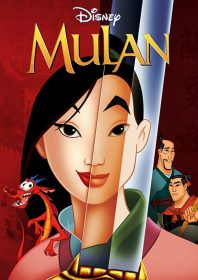
A welcomed hit for Disney following the slightly damp reception for both Hercules and The Hunchback of Notre Dame. Like many of the other titles released during the so-called ‘Disney Renaissance’ in the 1990s, this is based on another well-known story – in this case, the Chinese poem ‘Ballad of Mulan’, which dates from the 6th century and tells the fictional story of a woman who disguises herself as a man to replace her ageing father in the Imperial army. Its a rather refreshing take on the legend, with hand-drawn visuals inspired by Chinese art and locations (among them the Great Wall and Imperial Palace), not to mention some decent songs by Matthew Wilder and David Zippel with hits by Stevie Wonder and Christina Aguilera. Instead of the routine Disney damsel-in-distress formula, Mulan’s motives are not for love, but rather honouring the collective, loyalty to one’s country and respect for family. It is society which poses the greater existential threat, where prescribed limitations are placed on her freedom, power and authority because of her sex. Once disguised as a boy, she progresses far in the military, even rescuing her Captain, Li Shing (voiced by Jackie Chan in the Chinese versions), while overcoming the pig-headedness of her altogether useless male contemporaries. She is assigned national hero status when she stands up to the invading Hun army to protect the Emperor, after she is revealed to be a woman. (This is where the film diverges from the original source, which has Mulan maintain her disguise for 12 years). Her companion throughout all of this is a talking miniature dragon called Mushu, voiced by Eddie Murphy (channelling Robin Williams’ Genie), who adds energy to the film, even if he does ultimately end up overwhelming it. He’s a hoot for the kids, sure, but quickly becomes a pain for any adults in the room. The vocal talent includes Asian American actors like Ming-Na Wen, Pat Morita, BD Wong and James Hong, and although Disney are clearly at pains to provide a sensitive account of such a significant Chinese story, there is inevitably a distinctly Hollywood sensibility to the film. This would be singled out as one of the reasons the film did so badly in China, where it failed to do anywhere near the type of business The Lion King did several years before.
- Country: United States
- Action Director: B.H. Barry
- Directed by: Barry Cook, Tony Bancroft
- Starring: BD Wong, Eddie Murphy, George Takei, James Hong, June Foray, Miguel Ferrer, Ming-Na Wen, Pat Morita
- Produced by: Pam Coats
- Written by: Chris Sanders, Eugenia Bostwick-Singer, Philip LaZebnik, Raymond Singer, Rita Hsiao
- Studio: Walt Disney Pictures












